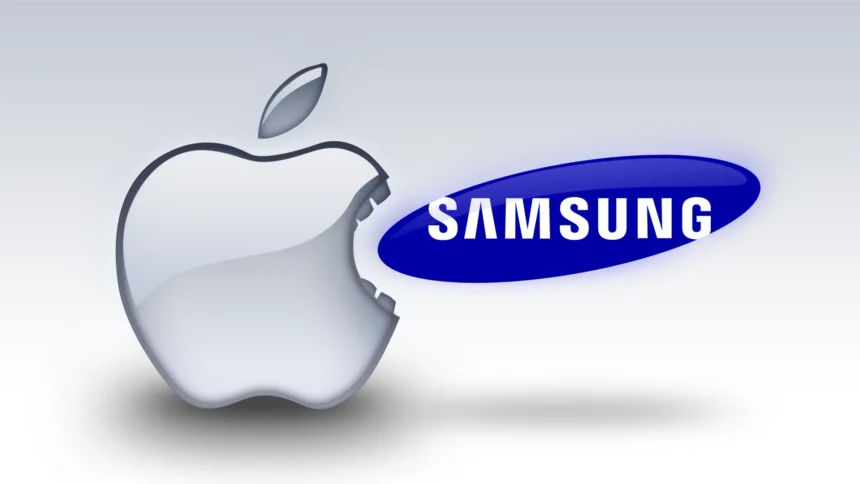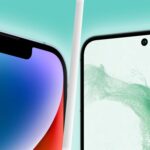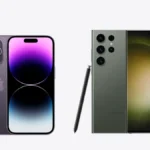Apple and Samsung continue to dominate the tech scene with their innovative designs, cutting-edge technology, and massive consumer bases. This comparison aims to dive deep into what sets these giants apart and how they continue shaping consumer choices in technology.
Related: Samsung Galaxy s23+ vs Samsung Galaxy S23 Ultra Specs
Apple vs Samsung
Apple and Samsung are the two biggest smartphone names, but choosing between them can be tricky. They both offer excellent devices but cater to different preferences. This in-depth comparison will guide you through the key features of Apple and Samsung phones to help you make an informed decision.
Design and Display
| Feature | Apple | Samsung |
|---|---|---|
| Design | Sleek, minimalist aesthetic | More variety, some with foldable options |
| Display | Excellent color accuracy, various sizes | High refresh rates, larger options |
Apple is renowned for its minimalist elegance, often utilizing a sleek, uniform design across its product line. Samsung, on the other hand, experiments with both conservative and bold design choices, catering to a broader audience.
When it comes to displays, Samsung often leads with its AMOLED technology, which is known for its vibrant colors and deeper blacks. Apple’s Retina displays, while less vivid, focus on color accuracy and eye comfort.
Camera
| Feature | Apple | Samsung |
|---|---|---|
| Megapixels | Lower megapixel count but excellent image processing | Higher megapixel count, detailed photos |
| Video Recording | Excellent quality, good stabilization | 8K recording capabilities on some models |
Both brands boast impressive camera specs, with Apple focusing on color accuracy and clarity, while Samsung pushes the envelope on high-resolution sensors and innovative photography features like 100x zoom.
In practice, Apple’s cameras are preferred for video due to superior stabilization and color grading, whereas Samsung’s cameras shine in still photography with detailed textures and dynamic range.
Performance and Battery Life
| Feature | Apple | Samsung |
|---|---|---|
| Processor | Apple-designed Bionic chips, known for efficiency | Powerful Qualcomm Snapdragon processors |
| Battery Life | Generally one-day battery life | Larger batteries, can last longer |
Apple’s proprietary chips, known for their efficient performance and integration with iOS, provide a seamless user experience. Samsung uses powerful Exynos and Qualcomm processors that excel in multitasking and high-performance tasks.
Samsung devices typically offer longer battery life and more versatile charging options, including wireless and reverse wireless charging, compared to Apple’s more conservative battery features.
Software
| Feature | Apple | Samsung |
|---|---|---|
| Operating System | iOS – Simple, user-friendly, known for security | Android – More customizable, open ecosystem |
| Updates | Long-term software support (typically 6 years) | Updates vary by model, typically 4 years |
iOS and Android represent two philosophies: iOS is for a controlled, consistent experience, and Android is for customization and flexibility. Each has its strengths, depending on user preference for simplicity or personalization.
Apple’s ecosystem is highly integrated, making device interaction seamless, which is a significant selling point for users invested in multiple Apple products. Samsung also offers integration features, especially with other Samsung and Android devices, but with less cohesion.
Other Features
| Feature | Apple | Samsung |
|---|---|---|
| Ecosystem Integration | Tight integration with other Apple devices | More open ecosystem, works well with various devices |
| Storage | Limited base storage options | Expandable storage options on most models |
Samsung often leads in introducing new technologies like foldable screens and UWB (Ultra-Wideband) technology, while Apple tends to perfect technology before it hits the market.
Samsung excels in offering a more customizable user interface with features like edge panels and Samsung DeX, which turns the phone into a desktop computing experience. Apple focuses on simplicity and efficiency with features like Continuity, which integrates macOS and iOS for smoother transitions between devices.
Pros & Cons
Apple
Pros:
- Excellent build quality and design
- User-friendly iOS software
- Long-term software support
- Tight ecosystem integration
Cons:
- Limited customization options
- Lower battery life compared to some Samsung models
- Generally more expensive
Samsung
Pros:
- More affordable options
- Powerful hardware and features
- Expandable storage
- More customization options
Cons:
- Software updates may not be as long-term
- User interface can be complex for some
Which Should You Buy?
- Choose Apple if: You prioritize a simple, user-friendly experience, value long-term software support, and are invested in the Apple ecosystem.
- Choose Samsung if: You prefer a wider variety of features and customization options, want a potentially longer battery life, or are looking for a more affordable option.
Who Should Upgrade?
- Apple users: If your iPhone is over 3 years old and feels sluggish, or you want the latest camera features, consider upgrading.
- Samsung users: If your Samsung phone is no longer receiving software updates or the battery life has significantly declined, it might be time for an upgrade.
Final Thoughts
Both Apple and Samsung offer exceptional smartphones. The best choice depends on your individual needs and preferences. Consider the factors outlined above to make an informed decision. There’s no wrong answer – it all comes down to finding the phone that best suits your lifestyle.
Related: Samsung vs iPhone
Apple vs Samsung Smartphone: FAQs
Q: Which brand is better, Apple or Samsung?
A: There’s no single “better” brand. It depends on your priorities. Apple excels in user-friendliness and long software support, while Samsung offers more customization and powerful hardware.
Q: When is the next iPhone launch?
A: Apple typically releases new iPhones in September.
Q: Are Samsung phones cheaper than iPhones?
A: Generally, yes. Samsung offers a wider range of price points, including more affordable options.
Q: Do Samsung phones have better cameras than iPhones?
A: Not necessarily. iPhones are known for excellent image processing, while Samsung offers higher megapixel counts and features like 8K recording on some models.
Q: Do Samsung phones last longer on a charge than iPhones?
A: Potentially. Samsung phones often have larger batteries, but battery life depends on usage.
Q: Is iOS or Android easier to use?
A: iOS is known for its simplicity, while Android offers more customization options. Both can be user-friendly, depending on your preference.
Q: Should I upgrade my iPhone?
A: Consider upgrading if your iPhone is over 3 years old, feels slow, or lacks desired features.
Q: How often does Samsung update its phones?
A: Update frequency varies by model, but typically around 4 years. Upgrade if your phone is no longer receiving updates or has poor battery life.





